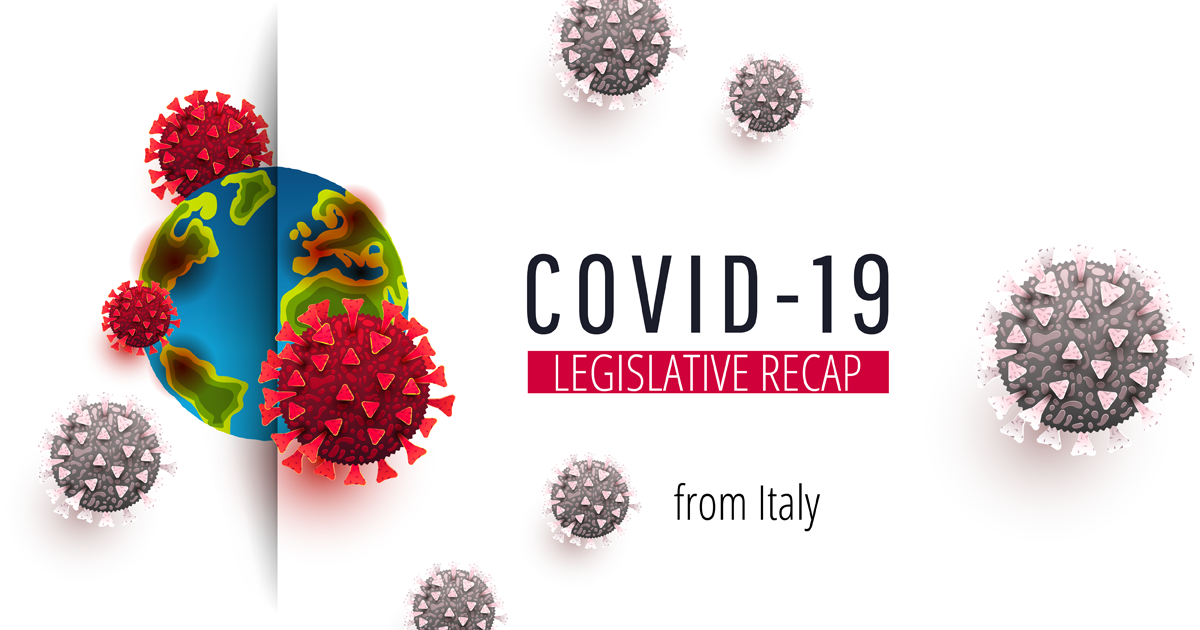Italy COVID-19 Legislative measures - The PM Decree 17/05/2020
On 17 May Prime Minister Conte approved a new Decree implementing the Decree-Law 16/05/2020 n.33.
From a political standpoint, it is worth underlining that the Cabinet first adopted a Decree-Law merely setting a broad legal framework, which is subject to parliamentary scrutiny, after both the opposition and the ruling majority, as well as several prominent legal scholars, criticised the frequent use of Prime Minister’s Decrees, which are immediately effective and cannot be amended by Parliament, and then approved a Prime Minister’s Decree laying down specific rules. Please find below a summary of the key provisions of the Prime Minister’s Decree.
First and foremost, the Prime Minister’s Decree lays down a detailed set of rules to contain the spread of COVID-19. The Decree mostly extends basic safety rules which were already in place pursuant to previous legislation which ceased to apply on 17 May and introduces new measures to reopen economic activities in full safety.
In particular, the Decree provides among other things that:
- persons suffering from respiratory infection with a fever higher than 37.5°C must stay at home and contact their GP;
- protective equipment must be worn in indoor public areas or indoor areas open to the public, including means of transportation, and in all other circumstances when social distancing cannot be ensured;
- social distancing of at least 2 metres for people exercising outdoors and of at least 1 metre for everyone else in public areas shall always be respected
- gatherings of any kind in public areas are prohibited;
- all sporting events remain suspended, but training sessions for both individual and team sports may resume as long as they are held behind closed doors, avoiding gatherings, and respecting social distancing, and the Ministry of Sports adopts the relevant safety guidelines which must be implemented by protocols adopted by each National Sports Federation;
- theatres, cinemas, and concert halls may reopen on 15 June, provided that social distancing between audience members is respected, with no more than 1,000 audience members for outdoor shows and 200 for indoor shows;
- places of worship may reopen as long as they avoid any gatherings and comply with the protocols agreed with the Government;
- museums and other cultural venues may reopen provided that they ensure social distancing between their visitors and avoid any gatherings;
- kindergartens, schools, and universities, except for medical schools, must remain closed;
- inmates showing symptoms related to COVID-19 must be isolated, possibly by being placed under house arrest or moved to public healthcare units identified by the NHS;
- Regional Presidents shall plan public transport within their respective territorial jurisdictions so as to avoid the overcrowding of the means of transportation and allow for their proper sanitisation, without prejudice to any decision by the Minister of Infrastructures and Transport to limit or suspend public transport according to the trend in the COVID-19 spread.
With specific regard to economic activity, the Prime Minister’s Decree is no longer based on ATECO codes and lists of economic activities exempted from the lockdown, instead allowing all businesses to reopen provided that they comply with the relevant safety protocols (all businesses across the country must comply with the safety protocol agreed between the Government, business associations, and trade unions on 24 April, as well as all other sector-specific protocols).
The Prime Minister’s Decree also lays down rules on cross-border travel, essentially extending the restrictions already in place.
The Prime Minister’s Decree is complemented by a wide range of sector-specific safety protocols as annexes.
It will remain in force until 14 June 2020, without prejudice to different deadlines foreseen by its provisions.






SocialTelos